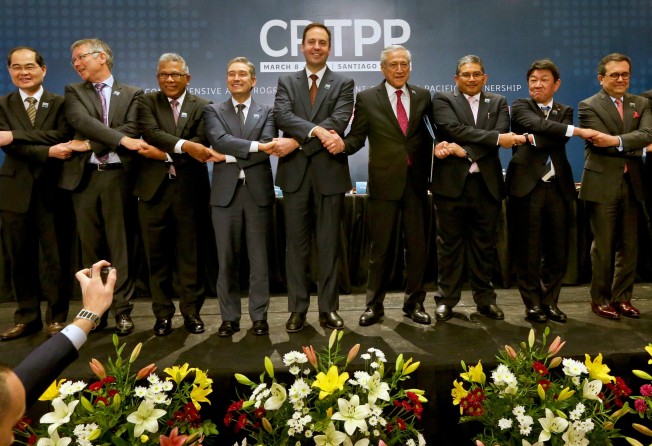China ‘needs’ trade pact like CPTPP to force it into domestic reform, says former commerce minister
- Wei Jianguo says China joining the Comprehensive and Progressive Agreement for Trans-Pacific Partnership (CPTPP) could spark positive reform in some sectors
- Wei says ratification of rival Regional Comprehensive Economic Partnership (RCEP) deal can also play an important role in negotiations with Japan and South Korea

Conditions are right for China to start negotiating entry into the Comprehensive and Progressive Agreement for Trans-Pacific Partnership (CPTPP), but it will be a “jump” for the country to meet the deal’s more stringent requirements, a former high-ranking minister says.
President Xi Jinping said in November last year that China was “actively considering” joining the trade pact, something that was reiterated by Premier Li Keqiang when he delivered the government’s annual work report last week. But there has been debate as to whether China would meet its terms of entry, including on state-owned enterprises, labour rights and e-commerce.
Wei Jianguo, a former vice-minister at the Ministry of Commerce, said China would need to carry out domestic reforms to join the trade deal.
“Some provisions of the CPTPP are more stringent, but China needs a higher-level free trade agreement to force reforms in some domestic fields and industries,” Wei told the state-backed 21st Century Business Herald on Wednesday.
“Chinese enterprises can no longer lie in the primary stage of World Trade Organization accession and reap dividends with their cost advantages, but should actively participate in a higher-level stage of global competition.”
Wei, who is now vice-president of the China International Economic Exchange Centre, said Chinese companies must reinvent themselves to become innovative “tide players” on the cutting edge of business.
The CPTPP is seen as among the highest class of multilateral trade deals, covering modern issues such as digital trade, as well as social issues such as the environment and labour rights.
Originally known as the Trans-Pacific Partnership, it was spearheaded by the US under the Obama administration until former US President Donald Trump pulled out of the pact in his first days in office in 2017.
It was signed in March 2018 by the remaining 11 countries: Australia, Brunei, Canada, Chile, Japan, Malaysia, Mexico, New Zealand, Peru, Singapore and Vietnam.
While it is unclear if the current members of the trade bloc are open to talks with China, it would be hard for them to ignore the country’s interest given its size and influence.
On Monday, China ratified the Regional Comprehensive Economic Partnership (RCEP), which is often regarded as a Beijing-backed alternative to the CPTPP, three months ahead of schedule.
China’s enthusiasm for the trade agreement, initiated by the Association of Southeast Asian Nations (Asean) in 2012, underlines Southeast Asia’s growing importance to the world’s second largest economy amid ongoing US-China trade tensions.

03:29
RCEP: 15 Asia-Pacific countries sign world’s largest free-trade deal
RCEP is also expected to ease China’s trade disputes with Japan and South Korea and play an important role in free-trade deal negotiations between the three countries, Wei said.
The three Asian nations account for about 24 per cent of the world’s economy with a combined annual trading volume of more than US$720 billion, forming one of the most integrated international economic blocs.
“If RCEP is a gaggle of wild geese, the China-Japan-South Korea free-trade zone is expected to be the lead goose, leading the RCEP regional economy to fly higher and farther,” Wei said.
The former official also said it should not be of concern that more manufacturers will relocate to Southeast Asia because of RCEP.
China respects the global division of labour, it does not seek and does not need to keep all supply chains within the country
“China respects the global division of labour, it does not seek and does not need to keep all supply chains within the country,” he said. “Most of the companies that have relocated to foreign countries maintain very close ties with the domestic supply chain.”
He said the most crucial thing for China was to enhance its leading role in the existing supply chains.
“For example, part of the textile and garment manufacturing industry may shift to Asean, but China may focus more on garment design and the production of high-end fabrics.